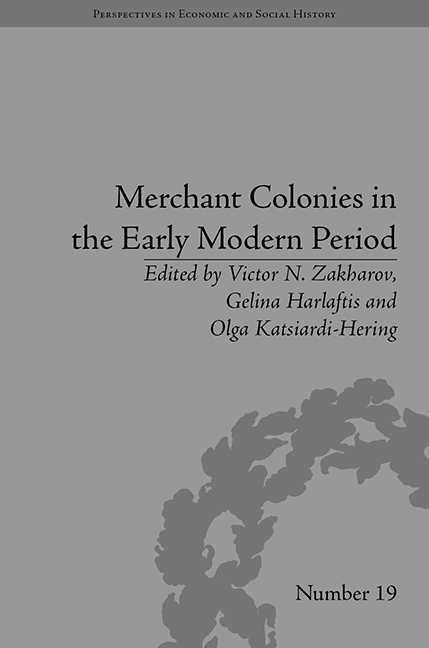Book contents
- Frontmatter
- Contents
- List of Figures and Tables
- List of Contributors
- Introduction
- 1 Early Modern English Merchant Colonies: Contexts and Functions
- 2 German and Italian Merchant Colonies in Early Modern England
- 3 Dynamism and Integration of the North European Merchant Communities in French Ports in the Eighteenth Century
- 4 Opportunity and Legislation: How the Armenians Entered Trade in Three Mediterranean Ports
- 5 Russian Merchant Colonies in Seventeenth-Century Sweden
- 6 Foreign Merchant Communities in Eighteenth-Century Russia
- 7 Greek Merchant Colonies in Central and South-Eastern Europe in the Eighteenth and Early Nineteenth Centuries
- 8 Community for Commerce: An Introduction to the Nezhin Greek Brotherhood Focusing on its Establishment as a Formal Institution in the Years Between 1692 and 1710
- 9 Entrepreneurship at the Russian Frontier of International Trade. The Greek Merchant Community/Paroikia of Taganrog in the Sea of Azov, 1780s–1830s
- Notes
- Index
2 - German and Italian Merchant Colonies in Early Modern England
- Frontmatter
- Contents
- List of Figures and Tables
- List of Contributors
- Introduction
- 1 Early Modern English Merchant Colonies: Contexts and Functions
- 2 German and Italian Merchant Colonies in Early Modern England
- 3 Dynamism and Integration of the North European Merchant Communities in French Ports in the Eighteenth Century
- 4 Opportunity and Legislation: How the Armenians Entered Trade in Three Mediterranean Ports
- 5 Russian Merchant Colonies in Seventeenth-Century Sweden
- 6 Foreign Merchant Communities in Eighteenth-Century Russia
- 7 Greek Merchant Colonies in Central and South-Eastern Europe in the Eighteenth and Early Nineteenth Centuries
- 8 Community for Commerce: An Introduction to the Nezhin Greek Brotherhood Focusing on its Establishment as a Formal Institution in the Years Between 1692 and 1710
- 9 Entrepreneurship at the Russian Frontier of International Trade. The Greek Merchant Community/Paroikia of Taganrog in the Sea of Azov, 1780s–1830s
- Notes
- Index
Summary
In early modern England, inspiration for commercial organization, growth and development was drawn from the practices and experiences of the late fifteenth century. In this earlier period, England was largely an agricultural country but the fact that she was strategically located and produced the finest wool in Europe made her a magnet for many foreign merchants. Merchants arrived from all over but the largest number came from the northern German cities and from many of the larger Italian cities such as Venice, Milan and Genoa. Merchants from Portugal, Ragusa, Brittany, Spain, France, Poland, Scandinavia and the Low Countries were also part of the English international trading scene. Given this intense interest, England became an international centre for trade that was both prolific and profitable by the early modern period.
England basically sold wool and cloth and in return purchased a great variety of needed goods from foreign merchants. Of the many foreigners that traded with England, the Germans and Italians were the most influential because they came in large numbers and with royal permission stayed and formed separate colonies. Each colony possessed individual qualities that required creative strategies to maximize profits while coexisting with the requirements of the host country. The Germans came from a collection of profit- seeking Baltic cities that were given special privileges in London including the right to administer a city-like zone called the Steelyard.
- Type
- Chapter
- Information
- Merchant Colonies in the Early Modern Period , pp. 31 - 44Publisher: Pickering & ChattoFirst published in: 2014



